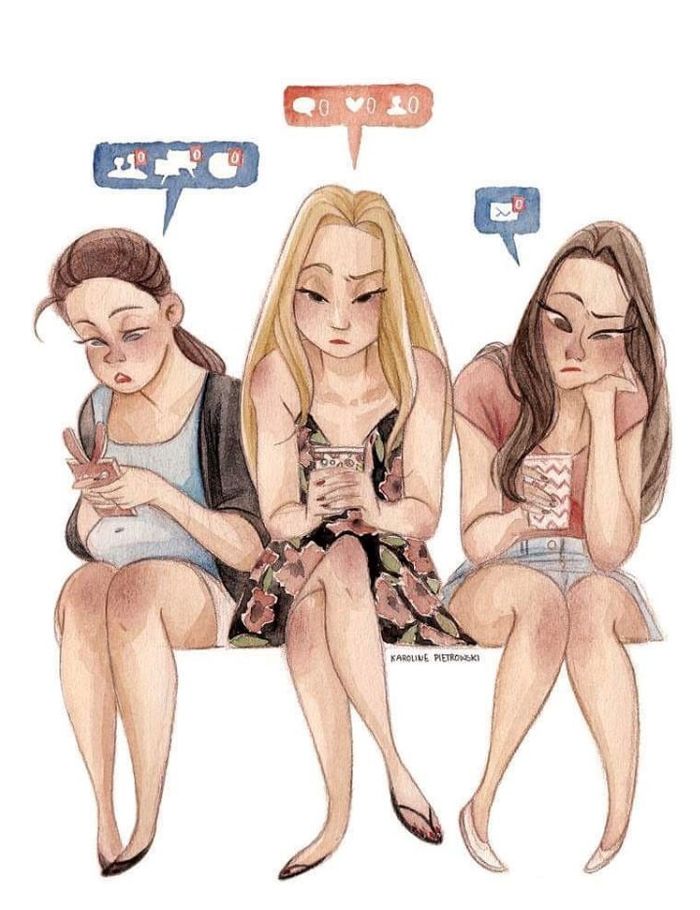The virtual superglue that binds us
Exploring the theme of ‘connection’, columnist Ella Gold, discusses reconnecting with old friends in the digital age
A few days ago, I received a message from a friend I hadn’t spoken to in years. Completely unexpectedly, a ping from the past lit up my sleepy phone screen, and, with a glance, I found myself catapulted back to 2016, when this particular friend and I were at our closest. It was a picture of the two of us from a gig we’d gone to together, a picture I had never seen, and which filled me with a warm nostalgia, sending my brain whizzing through faded memories of my mid-teenage years.
I’ve been talking to this friend ever since - someone whose picture my brain had pasted fairly firmly within the past portion of my mind, one of those memories we find ourselves scrolling through on a rainy day when in a reflective mood. And yet here he was, back in my life, at the touch of a screen and with one simple, sentence, standardised by Snapchat: ‘this day, 3 years ago’.
Reconnecting in such a way with people from our pasts is one of those lovely peculiarities of our social media age. We find ourselves living in a world in which, despite no longer talking to someone, we are never entirely disconnected from them unless we make an active decision to be so.
"Social media’s propensity to resist disconnection from old friends means that rather than completely losing touch, you only ever ‘nearly make strangers’ out of them."
Even blocking, the ultimate act of passive aggression, does not necessarily equate to a firm removal from our lives. The temporary nature of this act, and the fact that the animosity is likely short-lived, means I have friends whose blockees from many years past are now their most fervent Instagram followers.
The trend of 24 hour ‘stories’ currently sweeping practically every social media platform feeds into this perpetual connectedness. One-time Tinder matches and friends from nursery can know what you had for breakfast, what your dog is called and whether or not you’re going to cut your hair. To borrow a phrase coined by a friend of mine recently, social media’s propensity to resist disconnection from old friends means that rather than completely losing touch, you only ever ‘nearly make strangers’ out of them.
So, what are the consequences of this form of connection?
In some ways, this is a dangerous thing. Arguably, the way in which we keep up to date with our online acquaintances merely provides the illusion of true connection. Some of us find ourselves less and less inclined to actually message a friend to catch up on their lives. The desire to talk has been rendered somehow less pressing because we already know everything that we might have felt compelled to ask. This threatens real social interaction, transforming our lives into a kind of livestream, a lone voice calling out into the void, which is perhaps only answered by a heart emoji or that ominous, Orwellian notification that ‘so-and-so is watching’.
Equally, for those people who we wish to leave behind, whether exes, past situationships or toxic friendships, moving on can prove exceedingly difficult. Starting university is frequently romanticised as a chance to ‘reinvent yourself’ and reprioritise the people who you hold dear. But when social media allows past ghosts to haunt us ad infinitum, and the memories you chose to bury continue to rear their ugly heads, achieving a mental spring clean proves ever more arduous.
Ultimately though, despite the pitfalls, I believe that the tenacity with which possible reconnections cling to our online presence is a positive thing. When past connections remain suspended in our peripheral vision, we need not fear that those people who mattered to our younger selves are ever so far from our present lives as to be irretrievable. More often than not, the connection is there if we want it. If we swallow our pride, resist the easier identity of silent viewer, and actually reach out to that person with genuine communication, I think we would all be pleasantly surprised with what we might find.
 News / Hundreds of Cambridge academics demand vote on fate of vet course20 February 2026
News / Hundreds of Cambridge academics demand vote on fate of vet course20 February 2026 News / Judge Business School advisor resigns over Epstein and Andrew links18 February 2026
News / Judge Business School advisor resigns over Epstein and Andrew links18 February 2026 News / University Council rescinds University Centre membership20 February 2026
News / University Council rescinds University Centre membership20 February 2026 News / Petition demands University reverse decision on vegan menu20 February 2026
News / Petition demands University reverse decision on vegan menu20 February 2026 News / Caius students fail to pass Pride flag proposal20 February 2026
News / Caius students fail to pass Pride flag proposal20 February 2026










